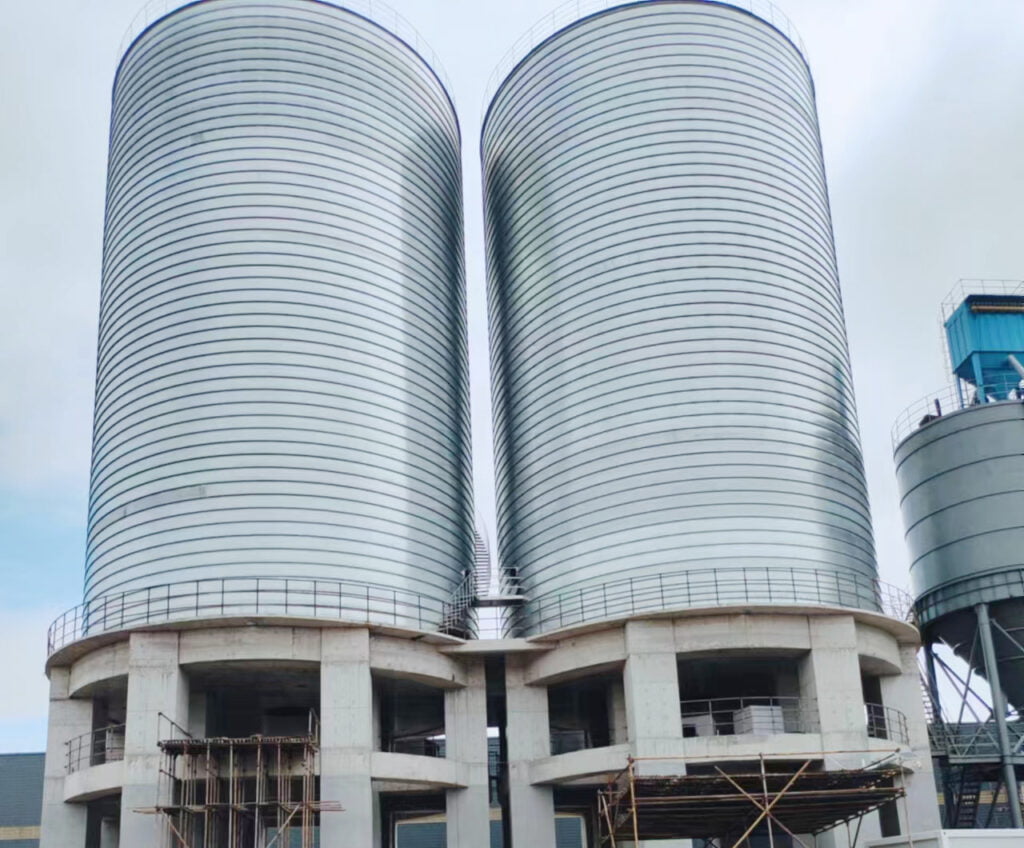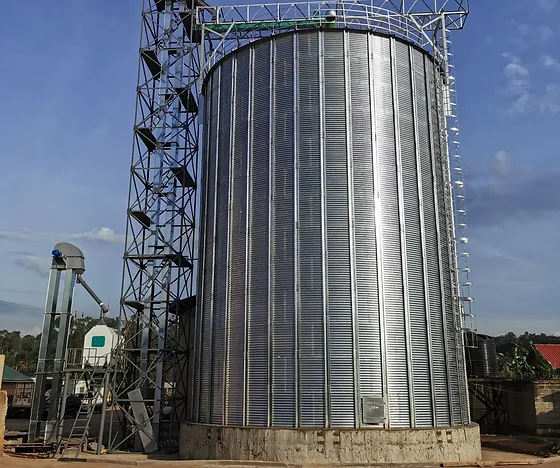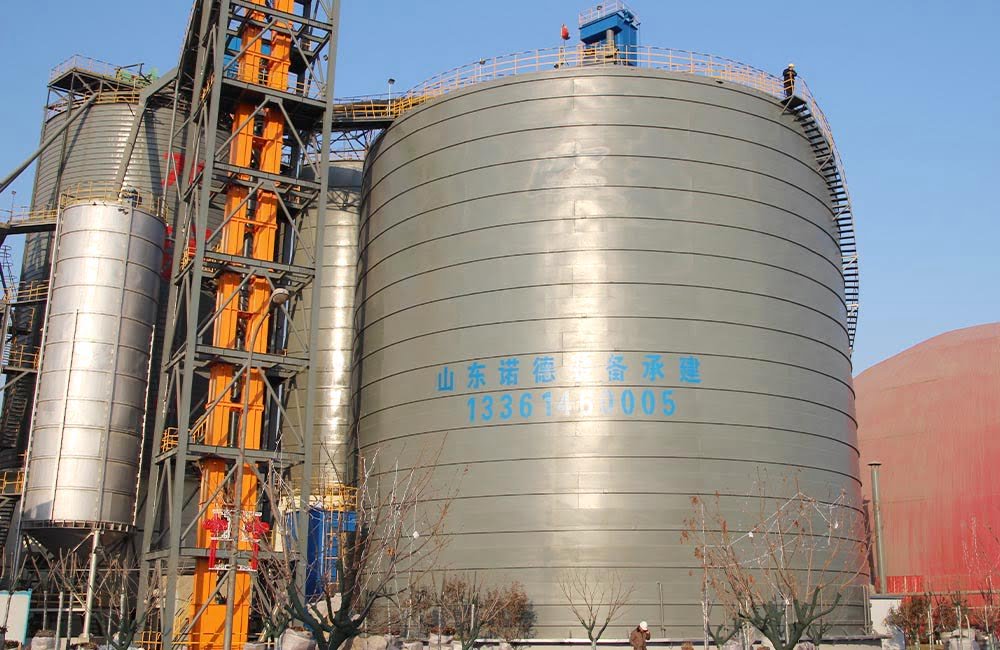介绍

Selecting the appropriate bulk material silo is a crucial decision for businesses across various industries. The right silo can optimize storage efficiency, streamline material handling processes, and enhance overall operational productivity. In this blog post, we’ll delve into five key factors to consider when choosing the right bulk material silo for your specific needs. From material characteristics to safety features, we’ll explore essential considerations to guide your decision-making process.
Material Characteristics
When considering a bulk material silo, a thorough understanding of the materials to be stored is essential. Various factors, including particle size, density, flowability, and corrosiveness, play significant roles in determining the suitability of the silo for the intended materials.
Particle size refers to the dimensions of the individual particles composing the material. Whether fine powders, granules, or larger aggregates, the particle size affects how the material behaves during storage and discharge. For instance, fine powders may be prone to bridging or compacting, while larger particles may require special considerations for flow control.
Density is another crucial factor to consider. Materials with higher densities exert greater pressure on the walls and bottom of the silo, potentially affecting structural integrity. Additionally, variations in density can influence material flow rates and discharge patterns, necessitating adjustments in silo design and operation.
Flowability refers to the ability of the material to flow freely within the silo. Materials with poor flowability may experience issues such as arching, ratholing, or erratic discharge, leading to operational inefficiencies and potential blockages. Understanding the flow properties of the stored material allows for the implementation of measures to promote smooth and consistent material flow.
Corrosiveness poses a significant challenge in material storage, particularly for substances prone to chemical reactions or degradation. Corrosive materials can accelerate wear and deterioration of silo components, compromising structural integrity and posing safety risks. Selecting materials and coatings resistant to corrosion is crucial for ensuring the longevity and reliability of the silo in corrosive environments.
Storage Capacity Requirements
When selecting a bulk material silo, accurately determining the required storage capacity is paramount. This entails a comprehensive evaluation of several factors to ensure the silo adequately meets both current and future storage needs while avoiding potential operational disruptions due to capacity constraints.
Firstly, assessing the material volume to be stored is fundamental. Businesses must analyze their material usage rates, production schedules, and inventory turnover to estimate the volume of material requiring storage at any given time. This evaluation provides a baseline for determining the minimum storage capacity required to support ongoing operations.
Additionally, considering usage patterns is essential for optimizing storage capacity. Understanding peak demand periods, seasonal fluctuations, and any foreseeable changes in material consumption patterns allows businesses to adjust their storage capacity accordingly. By aligning the silo’s capacity with anticipated usage patterns, businesses can ensure efficient material management and minimize wastage or stockouts.
Moreover, projecting future growth is crucial for avoiding capacity constraints and accommodating expansion plans. Businesses should factor in potential increases in production volumes, changes in product lines, and market growth projections when determining the optimal silo capacity. Incorporating a buffer for future growth ensures scalability and flexibility, allowing the silo to adapt to evolving business needs without necessitating costly upgrades or replacements.
环境考虑
Environmental factors play a pivotal role in determining the performance and longevity of bulk material silos. A comprehensive understanding of these factors is essential when selecting a silo to ensure durability and reliability over time.
Temperature fluctuations pose significant challenges to bulk material storage, especially in regions with extreme climates. Fluctuations in temperature can cause expansion and contraction of silo materials, leading to structural stress and potential damage. Moreover, temperature variations can affect material properties, such as flowability and moisture content, impacting storage stability and handling efficiency.
Humidity levels also warrant careful consideration, particularly in environments prone to high moisture content. Excessive humidity can lead to condensation within the silo, promoting mold growth, material clumping, and corrosion of metal components. Preventive measures such as moisture barriers, ventilation systems, and desiccants may be necessary to mitigate moisture-related issues and preserve material integrity.
Safety Features and Regulatory Compliance

Ensuring the safety of personnel and adherence to regulatory standards are critical considerations in the selection of bulk material silos. A comprehensive approach that integrates robust safety features and compliance verification is essential to mitigate risks and prevent accidents.
Incorporating a range of safety features is fundamental to safeguarding personnel working with or around bulk material silos. Access ladders and platforms provide secure access for inspection, maintenance, and operation, reducing the risk of falls and injuries. Guardrails along walkways and edges offer additional protection against accidental falls, especially in elevated or confined spaces. Emergency shut-off systems enable prompt response to potential hazards, allowing for quick containment and mitigation of risks in case of emergencies.
Moreover, verifying compliance with industry standards, building codes, and safety regulations is imperative to ensure the integrity and legality of bulk material silo installations. Adherence to standards such as OSHA (Occupational Safety and Health Administration) regulations, ANSI (American National Standards Institute) guidelines, and NFPA (National Fire Protection Association) codes is essential to demonstrate commitment to safety and avoid potential penalties or legal liabilities.
Supplier Reputation and Support
Partnering with a reputable supplier is key to ensuring the quality, reliability, and performance of the bulk material silo. Researching the supplier’s track record, customer reviews, industry reputation, and after-sales support services is essential. Choosing a trusted supplier with a proven track record of delivering high-quality products and responsive customer support will provide confidence and peace of mind in your investment.
| 方面 | 细节 |
|---|---|
| Supplier’s Track Record | Research the supplier’s history, including years in business, previous projects, and client testimonials. |
| 顾客评论 | Explore customer feedback and reviews regarding the supplier’s products, services, and overall satisfaction. |
| Industry Reputation | Assess the supplier’s reputation within the industry, including certifications, awards, and accolades. |
| After-Sales Support Services | Evaluate the quality and responsiveness of the supplier’s after-sales support, including maintenance services and technical assistance. |
结论
Choosing the right bulk material silo requires careful consideration of various factors, from material characteristics and storage capacity to environmental considerations, safety features, and supplier reputation. By prioritizing these five key factors and conducting thorough research, businesses can make informed decisions that optimize efficiency, reliability, and safety in bulk material storage and handling operations.
常问问题
What are the common applications of bulk material silos?
Bulk material silos are widely used in industries such as construction, agriculture, manufacturing, mining, and logistics for storing materials such as grains, cement, coal, and aggregates.
How do I determine the optimal storage capacity for a silo?
The optimal storage capacity depends on factors such as material type, quantity, usage patterns, available space, and future growth projections. Consulting with a silo expert can help determine the appropriate capacity.
What maintenance is required for bulk material silos?
Regular inspections, cleaning, and maintenance tasks such as lubrication, repair, and corrosion prevention are essential for ensuring the performance and longevity of bulk material silos.




